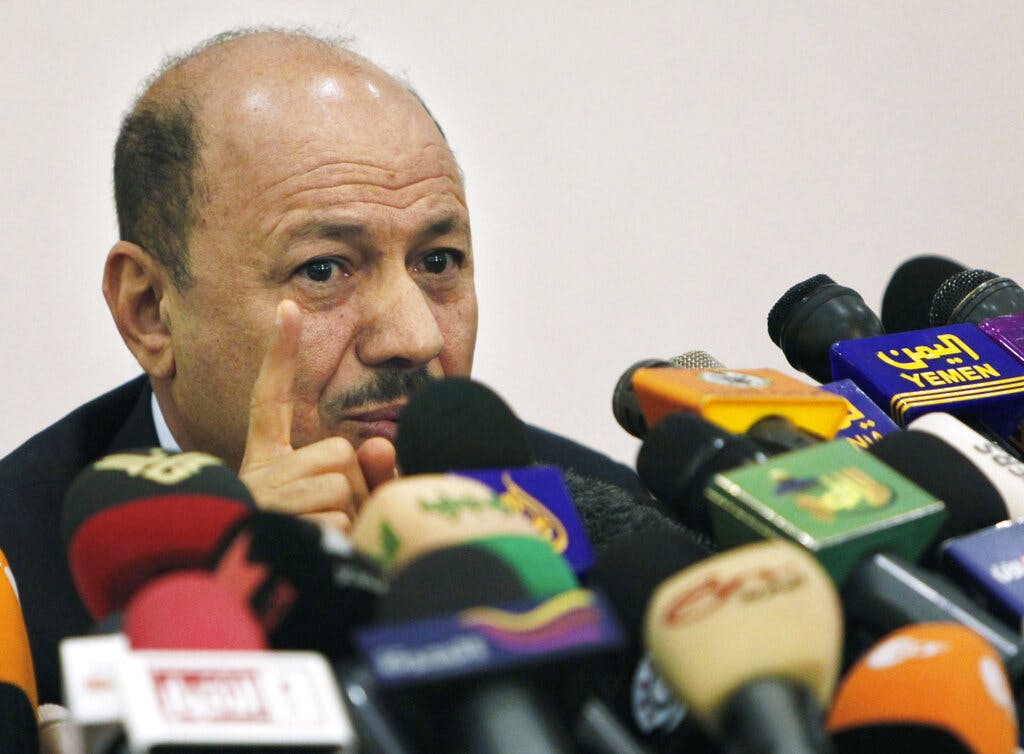Washington’s Backing of Yemen Power Reshuffle Seen as Effort To Woo Saudis
The Houthis, a powerhouse group within Yemen that has the backing of Iran, refuses to recognize the new leadership.

Attempting to mend relations with Riyadh, America is blessing a Saudi-orchestrated power reshuffle in Yemen.
Secretary of State Blinken today congratulated the newly installed president of the Yemeni leadership council, Rashad al-Alimi. In a phone conversation, Mr. Blinken “underscored the importance of an effective and transparent government that advances efforts to end the Yemeni conflict and protects human rights,” the State Department spokesman, Ned Price, said.
Unmentioned was how Mr. Al Alimi became the head of the eight-man leadership council: Riyadh last week orchestrated the removal from power of Yemen’s president since 2012, Mansour Hadi, who was unceremoniously placed under house arrest in Riyadh.
His successor, a former police general, is a veteran Yemeni politician with ties in Riyadh and Washington. The new council was secretly sworn in last week at an undisclosed location in the city of Aden. The Houthis, a powerhouse group within Yemen that has the backing of Iran, refuses to recognize the new leadership.
In blessing the new leadership, the Biden administration is seemingly reversing its hostility to Riyadh, and especially to its crown prince, Mohamed bin Salman, the de facto Saudi ruler who orchestrated Mr. Hadi’s removal from power.
In contrast to President Trump’s warm relations with the prince, known as MbS, the Biden administration has continually portrayed Saudi Arabia as the Mideast’s worst human rights violator. Highlighting the Saudis’ gruesome 2018 assasination of journalist Jamal Khashoggi and its rights violations in Yemen, Washington has denied frequent Saudi requests for arms.
Only after Houthi attacks on Saudi cities and oil fields increased did the Biden administration finally agree recently to bolster Saudi air defenses with new Patriot missile batteries.
Early in Mr. Biden’s presidency, the State Department further angered Riyadh, when it removed the Houthis from its list of terror organizations. Even as top Washington officials described the Houthi attacks on Saudi Arabia and the United Arab Emirates as terrorism, Mr. Biden declined to return the organization to the terrorist list.
With American inflation ballooning, partially due to rising oil and gas prices, Mr. Biden placed a call to MbS, hoping Riyadh would increase oil production. The crown prince, however, refused to take the call. The Saudis announced they’d stick with OPEC quotas. Further, MbS signaled he could make inroads with Communist China, turning away from a century-old Saudi alliance with America.
Mostly, the Saudis are concerned about America’s return to a pro-Iranian policy in the region. The policy was neatly summed up by President Obama in his admonition to Riyadh to “share” the region with Tehran’s Islamic Republic.
To allay Saudi concerns, Mr. Obama’s national security team allowed MbS to do as he pleased in his backyard, several sources say.
The 2015 Saudi-led intervention in Yemen’s civil war was launched “with the Obama administration’s blessing and generous logistical and diplomatic support,” a former special representative of the United Nations in Yemen, Jamal Benomar, says. It was “seemingly done to please the Saudis, who were at the time grumpy about America’s policy in the region,” he adds.
Members of Mr. Obama’s national security team now hold major positions in the Biden administration, and they return to the same playbook. American once again backs MbS’s Yemen maneuvering in order to appease Saudi concerns about America’s policies, such as negotiations with Tehran to revive the 2015 nuclear deal.
According to Mr. Benomar, the new Yemeni presidential council was “born with a legitimacy deficit,” as it is widely seen as a Saudi-led coup. “A presidential council made up of mainly warlords who benefit from the war economy… could only prolong the war,” he warns.
For the time being, the first Yemeni ceasefire in more than five years is holding up. Struck on April 2 after negotiations between the Saudis and Houthis under Omani auspices, the two-months truce has seen the opening of several airports as well as the right of ships to dock at the Houthi-controlled port of Hodeida.
“We welcome the announcement of the planned first commercial flight from Sana’a airport in six years,” a UN spokesman, Stephane Dujarric, said today. The flight to Amman, Jordan, is scheduled to take off from Houthi-controlled Sana’a on April 24.
Administration officials are hoping that the ceasefire will help drive down energy prices. The Houthis have attacked and mined Bab el-Mandeb, the narrow Red Sea passageway that serves as the main artery for oil deliveries to Asia. The truce could ease at least some of the pressure on global energy markets.
In today’s talk with Mr Al Alimi, Mr. Blinken expressed “support for the ongoing truce and the opportunity to provide relief to Yemenis by easing the movement of people and goods, including fuel,” Mr. Price said.
Yet some are skeptical that the truce will hold up for long. The Saudi-led coalition and Iran’s backing of the Houthis have created a war-favoring dynamic. “There will be no prospect for peace in Yemen unless the Yemenis are allowed to freely determine their future without interference from all regional powers,” Mr. Benomar says.

